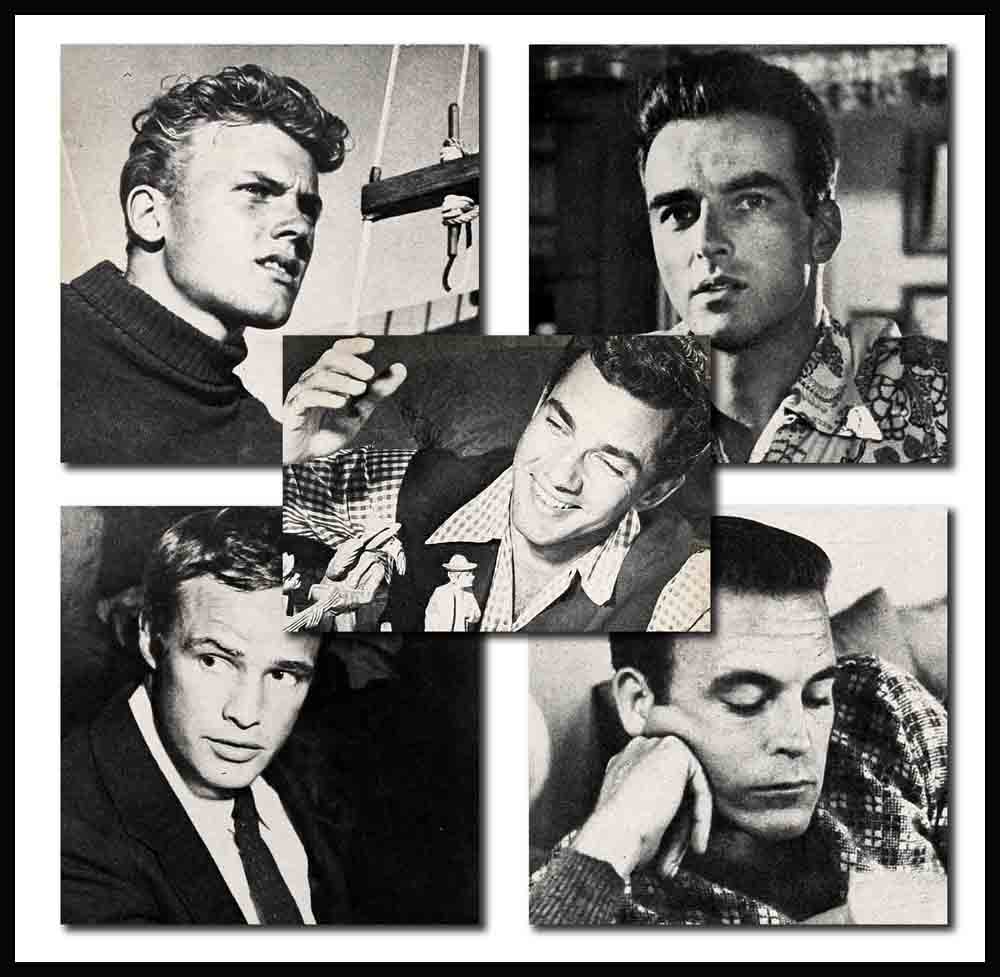
Should Young Actors Marry?
Should young actors marry?
Today, Tab Hunter, Scott Brady, Bob Wagner, Rock Hudson, Richard Allan, Montgomery Clift, Farley Granger, Byron Palmer, Marlon Brando and a host of other stars and near-stars are finding that this question prods uncomfortably close to home. They see before them examples of marriages that have helped careers, marriages that have almost wrecked careers, marriages that are as normal as those in Keokuk, and marriages which, though they may have been made in heaven, are somewhat mud-splattered from contact with the Hollywood earth.
To a young man in the process of building a career—any career—the puzzler, “Will a wife be a hindrance or a help?” is never far from the forefront of his mind. To a young man building a career in the movies, it’s an overwhelming problem that he can’t escape for a moment. For it’s not only his business—and the business of a capricious chap called Cupid—it’s the personal concern of every moviegoer who helps keep his name in lights.
What are the pros and cons? From the actor’s point of view? From the point of view of the girl he might marry? And from your point of view—the movie audience who want your actors the way you want ’em.
The problem of money confronts some of these young men. By the time they pay the tailor’s bill, there is little left over for the grocer. The problem of the “right girl” haunts others, and understandably. For how many women can stand the day-in, day-out challenge of their spouse’s association with the most beautiful women in the world, or the loneliness of separations from a husband who must be off to the four corners of the earth—where movies are more than likely to be made these days. But perhaps the hardest problem of all to solve is the effect of marriage on their careers. Would your favorite, for instance, be as romantically appealing to you if you knew that when the day was over he settled down quietly at his own fireside, and was no longer a dashing, gay bachelor-about-town?
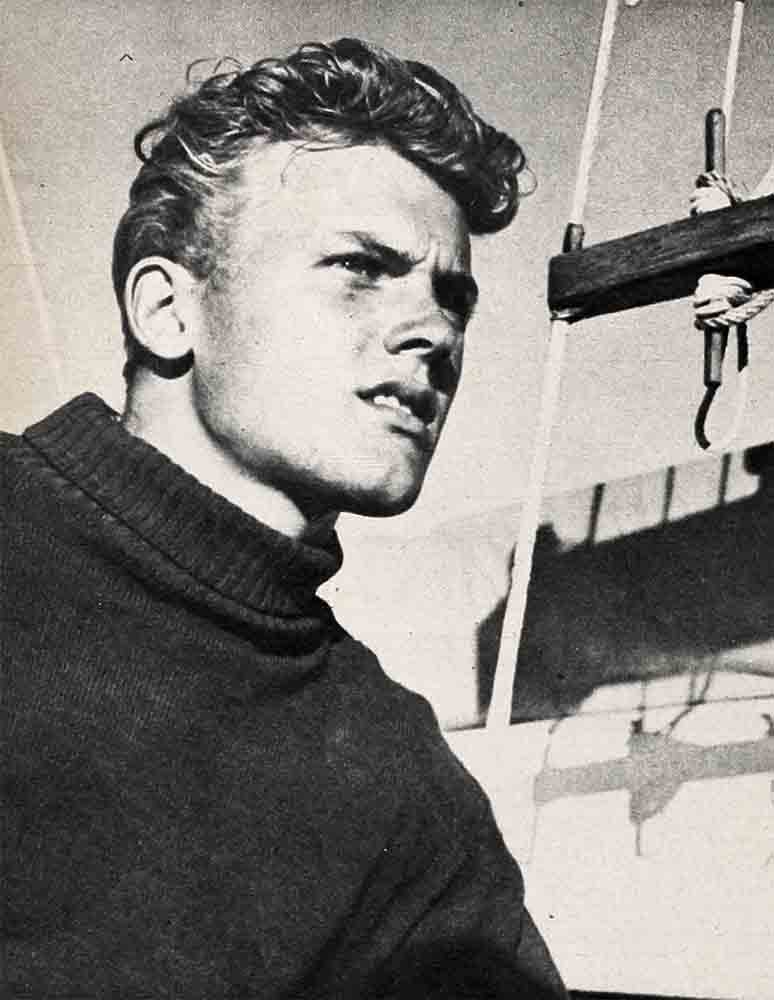
Handsome. Tab Hunter minces no words about his dilemma. “There are two girls,” says he, “who make me hear wedding bells. If I let myself, I could really fall in love with either of them. But until there are some changes made, I know I’d better shy away from both of them.”
The changes he has in mind are purely financial. Since his initial success in “Island of Desire,” young Tab has, by his own admission, been having too much of a ball. He hasn’t taken his career seriously enough. Lots of laughs, lots of picnics—and not nearly enough hard work. And now, wistfully yearning for wedding bells, he is facing the fact that all play and no work makes Tab a very poor boy.
“My asking price per picture,” he says, “is two thousand a week. But I don’t work very many weeks. I can’t afford to think about marriage, much as I’d like to.”
He’s right, of course. While two thou- sand dollars a week sounds like a lot of money, it’s not when you work, say, only nine weeks a year, and when your financial responsibilities are heavy and extend over the entire fifty-two-week span. Tab maintains an apartment for his mother, and in cases like her recent serious illness, he, of course, foots the bills. And he has his own bachelor quarters to keep up, his car to operate, his wardrobe to maintain. Under the circumstances, a guy can scratch up enough money for a fun date now and then. But marriage?
A wife might be just exactly what Tab needs to help him get his career straightened out. She could be, that is, if she loved him and believed in him enough to make the fulfillment of his career her own goal, enough to make financial sacrifices to help him on his way.
But even if Tab should be able to find such a paragon, would you moviegoers accept her? Would you continue to be as loyal a follower of Tab’s?
Or how would you feel about Bob Wagner as a married man?
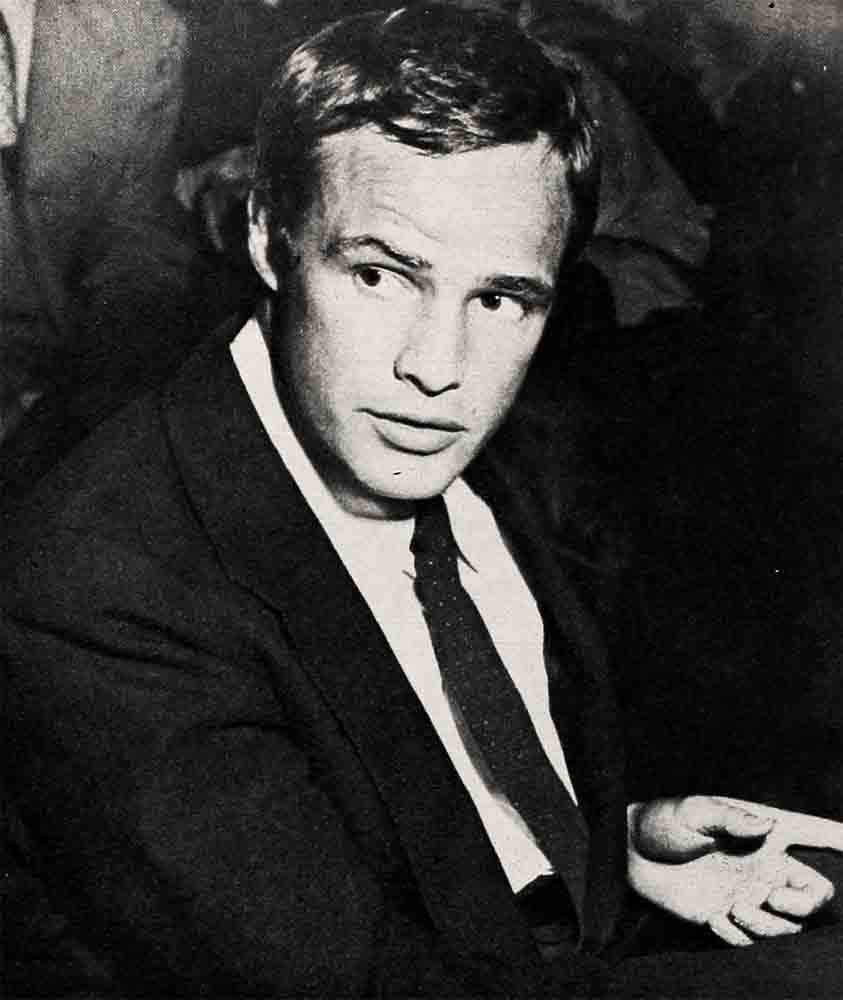
Bob has already warned Hollywood’s lovelies, publicly and in print, that he intends to enjoy at least six years more of single bliss. “I won’t be able to consider marriage,” he puts it, “until I’m thirty or older. I’m honest enough to admit that right now my career is all-important. I can’t let anything interfere with it until I’m well established, so marriage for me is out of the question for quite a few years.”
But falling in love is never out of the question. And if it happens to Bob before his self-imposed six years is up, should he follow the dictates of his heart?
There are some who feel that for Bob, almost more than for any of the other young actors in Hollywood, marriage now could be dangerous. And they point to the case of Dale Robertson as an example.
Careerwise, Bob stands today in pretty much the same spot in which Dale stood only a short while ago. “This guy,” the experts said of Dale, “is a second Gable. He’ll be around for another thirty years.”
Then his marriage hit a little rough weather. And because the movie public were interested in everything about him, they were interested in that, too. All marriages have difficult periods—but all estranged husbands don’t react as Dale did. He got sore at the world because he couldn’t solve his personal problems. And the world, at least the world of moviegoers, retaliated by turning their backs on Dale, his emotional problems and, most important of all, his films. He plummeted rapidly down from the position of high popularity he’d held. It wasn’t his being married that his public minded; it was just that he couldn’t seem to make his marriage work.
If marriage were to hurt Bob Wagner, it would have to be in a way similar to that in which it hurt Dale. Because of publicity. The two men are as unlike each other temperamentally as two men can possibly be, and while their personal reactions under similar circumstances would be worlds apart, the overall effect could not help but be more or less the same.
Dale, during difficult periods, has been violently anti-publicity, because he felt it was an invasion of his privacy, that he was, perhaps, too big a star to be bothered. Bob is turning anti-publicity too. But his reason is quite different. He doesn’t think that he’s a big enough star—yet.
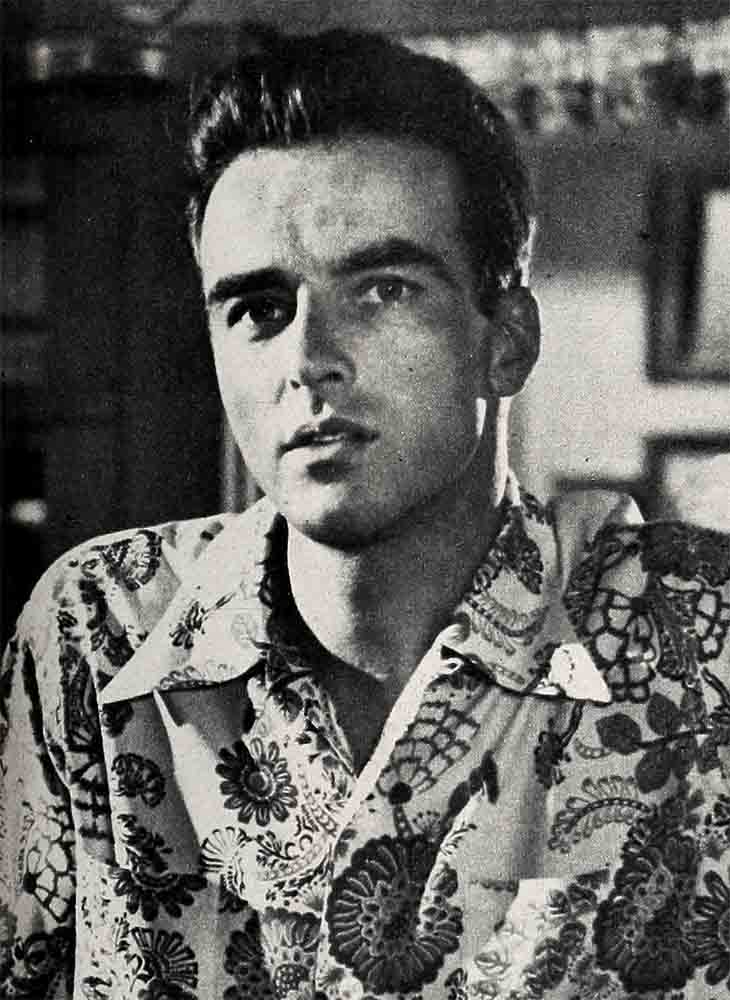
“People will get sick of my face,” he says, “bored with me because nothing new is happening in my life. I hope to be making movies ten years from now, and I don’t want the public to be tired of me by then.”
If Bob were to fall in love, publicity would, of course, be unavoidable. With his intention to remain single on the rec- ord, Bob would have to fall desperately in love to change his mind. And a desperately in love, intense Bob Wagner might resent conducting his romance like.a threering circus for the enjoyment of the world-at-large. Amiable and co-operative he is, but marriage in a goldfish bowl might make him react badly. It’s possible that even Bob, who has the world on a string, might wind up with a case of the nervous jitters that could lose him his public.
Rock Hudson is another who, like Tab Hunter, insists that the chief barrier between him and the joys of marriage is a lean pocketbook. “Sure, I want to get married and raise a family,” he says, “but not until I’m positive that I can provide for them. . . .”
People close to him believe that it was his stubbornness on this point that broke the back of his romance with Vera-Ellen. There’s no doubt that Rock was really serious about the little dancing star; but he was equally serious about his conviction that a self-respecting man should be the sole support of the family. Certainly, under no circumstances, should his wife earn more than he does—and Vera was doing just that at the time. And, as the story goes, Vera wasn’t willing to wait until he achieved what he considered security. And so the story ended.
But things are different now. Rock is in the two-thousand-a-week bracket, and he does work regularly. What’s more, his star is rising steadily in the U-I firmament. So it can’t be the old debbil dollar that’s really worrying him. And it’s certainly no lack of ladies in his life. It seems much more likely that he’s afraid—afraid of losing his freedom, or his following. Do you agree that Rock has this to fear?
That word, “afraid,” crops up again and again in relation to Hollywood bachelors, and Scott Brady has had the tag applied to him probably more often than all the rest put together. When he hasn’t been accused of being frightened, Scott’s been accused of being a wolf.
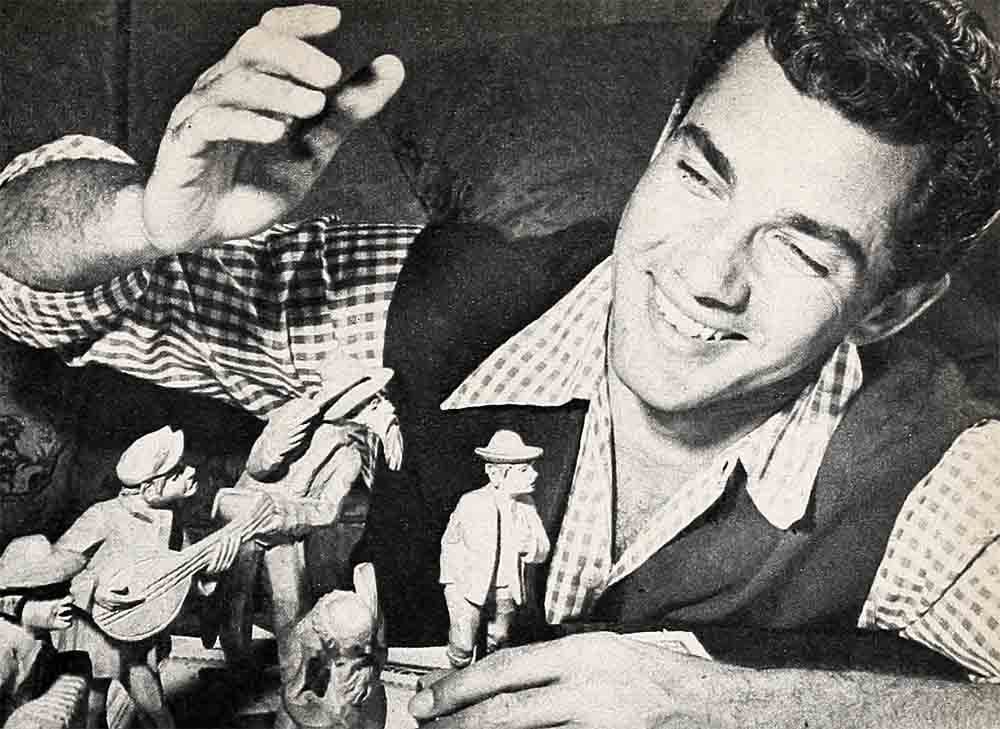
As Hollywood careers go, Scott’s has been moving consistently along at a gratifying, steady pace. His movies are always draws. There is, never-flagging interest in stories about him, pictures of him. Yet, there are some who feel that Scott would be even more popular if his public could be convinced that his wild oats were sown, that he was settled down and secure.
He himself says, “I probably want to get married more than any guy in this town, but there does have to be a girl!” And a quiet voice from somewhere in the background whispers, “If that’s the case, Scott, what ever happened to you and Dorothy Malone? Isn’t it closer to the truth to say you think your public prefers you as a man-about-town?”
With how many of Hollywood’s eligible bachelors is the problem what Scott insists his is—finding the right girl? How about Byron Palmer, for instance? The motto of this tall, blue-eyed Irishman could be, “Don’t call me; I’ll call you”—there are that many girls keeping his phone busy. He is personable, urbane and much-sought-after. But it’s going to take a very special miss to make him have a second go at marriage.
By’s first love is his young daughter, Linda Lou, and he doesn’t care who knows it. His weekends are devoted exclusively to her, his heart is full of her, and she will be his primary concern if he should remarry. Many a local beauty would say without hesitation, “Of course, I don’t mind his having a child.” But By isn’t interested in a girl who “wouldn’t mind.” The girl who captures him will be glad he has this particular child. His problem is where to find her—an adult human being intelligent and sensitive enough to adapt herself to a ready-made family. Though it may be unconscious, it is all too easy for a young bride to fall into competition with a child for the affection and attention of the man who is husband to one and father to the other. Such a situation could do nothing but harm to Byron Palmer, both emotionally and professionally.
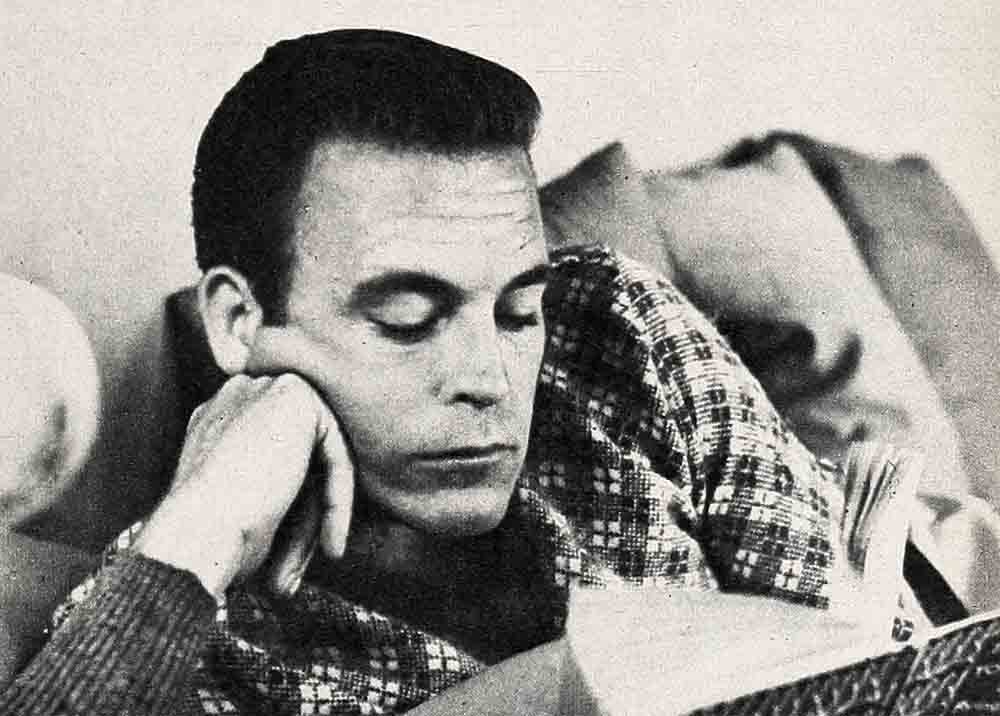
Would his public have preferred it if Byron Palmer had done what so many others have: kept his child a secret and passed himself off as an unfettered, gay blade? Or would they rather he find the “proper” wife to make a home for him and Linda Lou?
With some of these young actors, you can’t help coming to the reluctant conclusion that, for the time being at least, they might be right in their conviction to remain single. But for others, marriage seems the only proper destiny.
Take a look at Richard Allan, who asks forlornly, “What could I possibly offer a girl?” What can he offer? Good looks. Talent. Drive. A sense of humor and a charming sensitivity. Thinking about him as he is today, lonely in his little house up in the hills, it’s hard to escape the conclusion that a wife might strengthen his confidence. For Dick, like many men of charm and talent, is moody. If he had a wife who loved, encouraged and believed in him, wouldn’t he, perhaps be better-equipped emotionally to go out and fight for the one big role he needs to prove himself? Or would he?
The only possible answer to that lies in the effect that marriage has had on a couple of other moody young actors—Tony Curtis and Jeff Hunter. While Tony was doing fine, of course, even before he and Janet Leigh were married, he would be the first to insist that his career started to soar sky-high before the last echo of the wedding bells had died down. And as for Jeff Hunter, when he and Barbara Rush were married, they were both broke and just beginning. Their marriage was frowned upon as a move that might prejudice both their careers.
But what nobody took into consideration is how much in love these two were. They had enough courage to risk the wrath of their bosses, enough faith in the loyalty of their movie public to gamble a little. And the gamble paid off.
How different both those happy-marriage stories are from the rather pathetic marriage-saga of young Richard Jaeckel. Whether it was his idea or his studio’s it’s hard to say, but when he first appeared on the Hollywood scene, he was presented as a bachelor. It was only months later that the truth came out: Dick was married and the father of two. Since then, the marriage has broken up—and you aren’t hearing any sensational stories of a spectacular rise to stardom for Dick. Was the pretense worth it?
And will it be worth it in the case of young Rick Jason? His pretty wife accompanies him to Hollywood affairs, but Rick would just as soon nobody knows she’s his wife. He has an idea that he’s likely to be considered more glamorous if people think he’s single. He may or may not be right.
Are you movie-lovers just as fond of Rick now that you know the truth? And would you be more or less fond of, say, Marlon Brando if you suddenly heard that he had given up his odd-man-out tactics and had settled into a normal, happy marital relationship? Or of Farley Granger, if he were to give up squiring other men’s wives and get a wife of his own?
And how would marriage affect your feelings about Montgomery Clift? He is a young man of mystery, of mood, a young man about whom somehow there hovers an air of a story untold, of a secret love unfulfilled. Is it this that makes him so appealing? And if he were to be married, would this intangible quality be lost?
The butcher, the baker, the candlestick maker doesn’t concern himself with what the public thinks of his private life. The actor does. He must. Not one of them takes that big step to the altar without asking himself what affect it will have on his career.
What do you think? Using the ballot on page 57, tell your favorites how you feel about marriage for them. Your opinion is important. Should young actors marry?
THE END
It is a quote. PHOTOPLAY MAGAZINE APRIL 1954




